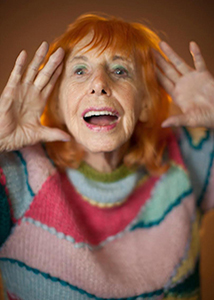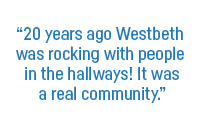 Dancer and filmmaker Edith Stephen was born in Salamanca, New York, in 1919 and grew up in Brooklyn. For years she toured the U.S., Europe, and China with her dance troupe until taking up film-making. One of the original tenants of Westbeth, Stephen’s fifth and latest documentary is “The Invisible Writer Who Becomes Visible.” She is also featured in the film “Winter in Westbeth,” a celebration of creativity in the elderly.
Dancer and filmmaker Edith Stephen was born in Salamanca, New York, in 1919 and grew up in Brooklyn. For years she toured the U.S., Europe, and China with her dance troupe until taking up film-making. One of the original tenants of Westbeth, Stephen’s fifth and latest documentary is “The Invisible Writer Who Becomes Visible.” She is also featured in the film “Winter in Westbeth,” a celebration of creativity in the elderly.
Although she was born into a strict, Orthodox Jewish family, Edith Stephen’s parents were determined she and her sister grow up to be Americans first. “My parents had emigrated here and had an arranged marriage as well,” she says. “But they were also individuals. They let us do whatever we wanted so that we would be Americans in America. They didn’t want us to be Russian or Polish like them. But I was always very happy that I had that background as well. It made me appreciate people who are different from me.”
This freedom allowed Stephen to take a less conventional path through life. “I didn’t follow the normal way of going about things,” she says. “But when it came to dancing, I was a natural. I always say that I jumped out of my mother’s belly dancing. Actually, though, when I started to dance people told me, ‘Oh, you’re too old to dance.’ I was 15 when they said that! But I stuck to it, became a choreographer and started my own company. And I traveled the world doing it. That sounds big, doesn’t it? ‘The world!’” She laughs.
“I think everybody should dance,” she continues. “I always claim I got to this age because I was a dancer. Doctors and researchers now say that the immune system can cure cancer but I could have told them that! Dancing is great for the immune system because it’s the one thing that involves every part of you if you’re doing the right kind. It’s immensely exciting, too, because it’s about you and your body does not lie. When a person walks into a room, right away you get something from them—either good or bad—by the way they move. I could sit here and know a person a block away just by the way they walk.”
When Stephen hung up her dancing shoes, she turned to making films. She claims the transition was made easier by the fact that from the start, her dances always told a story and she used mixed media to tell it. “I had poetry in my dance,” she says. “I had film, sculpture, and painting as well. Of course dance was the important thing. So it was very easy for me to transfer to film because it has all those same elements in it. It was just a different medium. But I tell you that I could never do film if it wasn’t for video. It made it so easy.”
 When Stephen married her husband in 1942, they first lived in Brooklyn. Later they moved to various apartments in the Village until Westbeth opened, becoming some of its very first tenants. “I think that the Village is one of the really exciting places in the City,” she says. “But when our last mayor, Michael Bloomberg, transformed this place into Millionaires Row I felt like I lost both my Bohemian life and my home.” And, closer to home, changes are palpable as well, if for other reasons. “These days, if you open my apartment door the public spaces are empty,” she says. “But 20 years ago Westbeth was rocking with people in the hallways! They were talking, or fighting, or bringing food to each other. It was a real community. Today there’s not one person in the entire hallway. There’s no communication anymore except through your fingers. It’s a different world.”
When Stephen married her husband in 1942, they first lived in Brooklyn. Later they moved to various apartments in the Village until Westbeth opened, becoming some of its very first tenants. “I think that the Village is one of the really exciting places in the City,” she says. “But when our last mayor, Michael Bloomberg, transformed this place into Millionaires Row I felt like I lost both my Bohemian life and my home.” And, closer to home, changes are palpable as well, if for other reasons. “These days, if you open my apartment door the public spaces are empty,” she says. “But 20 years ago Westbeth was rocking with people in the hallways! They were talking, or fighting, or bringing food to each other. It was a real community. Today there’s not one person in the entire hallway. There’s no communication anymore except through your fingers. It’s a different world.”
Stephen will turn 98 years old on April 2nd. Does she have any thoughts on such an accomplishment? “I don’t consider turning 98 an accomplishment,” she says. “Instead, I think that everybody should grow young as they grow old. They should be active. Life is living! Too many people are defeated by the idea that they’re old, so they become old. I always believed I was young. I watch little children and they’re so adventurous and curious and that’s what we lose as we grow older. Never lose your curiosity!”
Photo: Duncan Hewitt/ta-DAH! photo.
